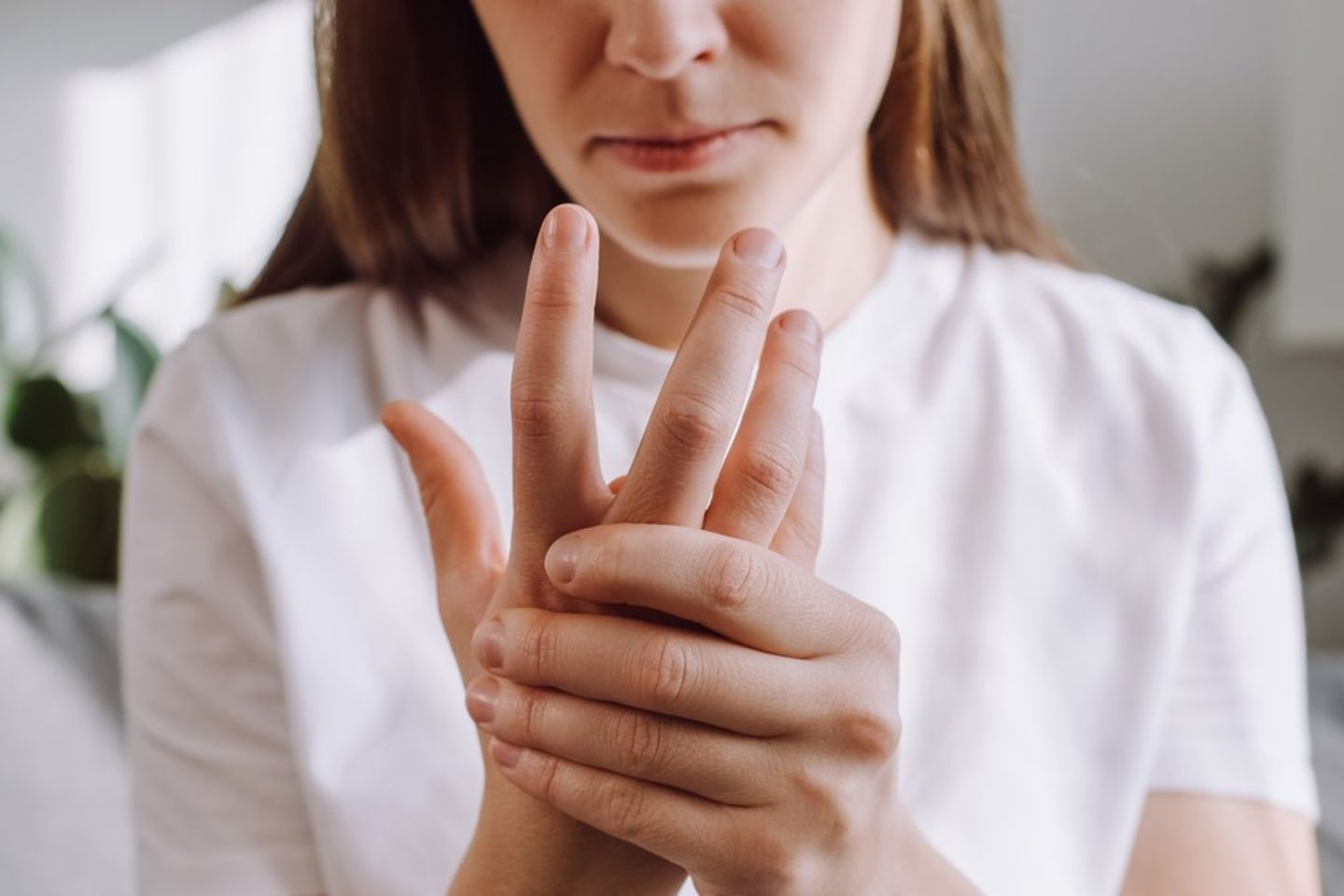Sport despite rheumatism
Regular exercise is so important
People suffering from rheumatoid arthritis often suffer from swollen and painful joints.
© Yurii_Yarema/Shutterstock.com
More than 20 million Germans are said to suffer from a rheumatic disease – but that doesn’t mean they shouldn’t do without sport.
According to information from the German Rheumatism League, around 20 million people in Germany suffer from a rheumatic disease. This generic term includes numerous diseases such as rheumatoid arthritis, Bechterew’s disease or systemic lupus erythematosus (SLE). Regardless of whether they are children or seniors: Patients are usually restricted in their movements or plagued by pain if they are not treated correctly. In her new book “In der Consultation: Rheumatism” (KOSMOS Verlag, published on August 18), specialist Dr. Eva Christina Schwaneck on the myths surrounding the diseases. From her point of view, the topic of sport and nutrition is particularly important for rheumatism patients.
In an interview with the news agency spot on news, the expert explains how important regular exercise is for rheumatism patients. In addition to some tips in the area Sport, she also gives an assessment of the topic of nutrition and gets to the bottom of the question of whether Ayurveda cuisine has a positive effect on rheumatism patients.
In this country, the term rheumatism is often understood to mean chronic inflammatory rheumatoid arthritis. What are the characteristics of this disease?
dr Eva Christina Schwaneck: Rheumatoid arthritis is classic articular rheumatism. The joints swell and hurt. The hands are particularly often affected. Patients notice pain, stiffness, and perhaps fever and fatigue. Women are more commonly affected than men and the disease can occur at any age.
Rheumatic diseases are usually associated with severe joint pain. The overcoming to sport is not easy for many. Are there gentle sports that patients can try?
dr Schwaneck: Ideally, the disease should be treated so well that all sports are possible. If that doesn’t work or the patients are older and have other joint problems, swimming is ideal. Sometimes Nordic walking is also good. There are also offers from Rheumaliga or health insurance companies.
Which sports would you definitely not recommend to rheumatism patients?
dr Schwaneck: “Stop and go” sports such as squash, which put a lot of strain on the joints, are problematic.
What is the risk of injury when playing sports? Is this increased in rheumatism patients?
dr Schwaneck: Normally not. However, it is possible that osteoporosis, i.e. bone loss, is present in addition to the rheumatism and the patients can break their bones more easily. In this context, riding or skiing and the like would be problematic. But even gentle sports such as yoga can lead to fractures in the spine if you are too ambitious.
Why is it so important to exercise despite rheumatism?
dr Schwaneck: Bodily functions that are not used wither away. The joints have to be moved in order not to stiffen. Likewise, the bones must be stressed in order not to develop osteoporosis. In addition, a previously damaged joint can be protected by good surrounding muscles. Sport also helps against the side effects of cortisone therapy and can prevent diabetes, for example.
Some rheumatism patients, for example, have to struggle with increased weight due to treatment with cortisone. What is the best way for these patients to proceed if they want to lose weight?
dr Schwaneck: In fact, we know from the large registers that, on average, rheumatism patients are by no means more overweight than people without rheumatism. Nowadays, attempts are also made to avoid the long-term use of cortisone in higher doses. This means that it should first be checked whether the so-called basic therapy can be improved in order to get away from cortisone. Where this is not possible in exceptional cases, patients must fight the weight with a protein-rich, balanced diet and endurance sports, which can be difficult.
A balanced diet plays an important role for both healthy people and those suffering from rheumatism. Are there foods that can harm sick people?
dr Schwaneck: There are no good studies on this. There is actually no “rheumatic diet” that has been proven to help most patients. But sometimes it can make sense to try things out a bit yourself. Many patients credibly report that not eating pork helps them. It has been proven that obesity worsens the disease and the pain, which is why I would always advise patients to aim for a normal weight. Being underweight doesn’t make sense either.
Can certain foods, perhaps roots, vegetables, or spices, support or enhance the desired effect of drug treatment for rheumatoid arthritis?
dr Schwaneck: There are a few small studies on spices that are popular in Ayurveda cuisine, such as cinnamon, garlic, saffron or turmeric. These had a positive effect on the symptoms of rheumatoid arthritis. The studies mostly had very few participants and of course no placebo group. But if you enjoy cooking and want to try Ayurveda cuisine, then you should definitely do so.
